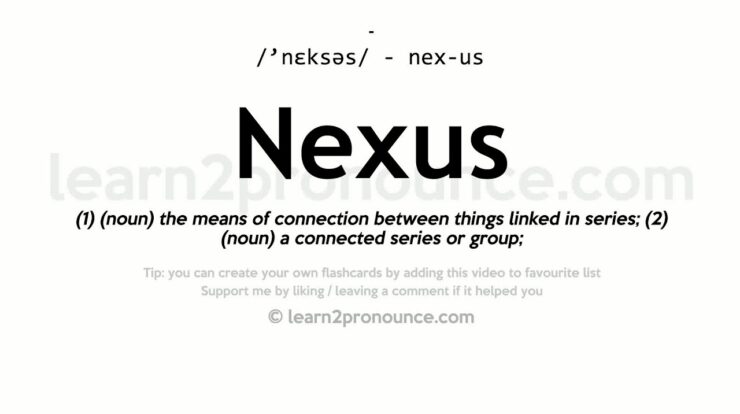
At the heart of our interconnected world lies the concept of “nexus,” a term that encapsulates the intricate web of relationships, connections, and interdependencies that shape our lives. From its etymological roots to its diverse interpretations across disciplines, nexus definition provides a lens through which we can unravel the complexities of our existence.
Nexus, derived from the Latin word “nectere,” meaning “to bind” or “to tie,” has evolved over time to encompass a multitude of meanings. In legal contexts, it refers to the connection between an individual or entity and a particular jurisdiction, establishing the basis for taxation and legal obligations.
Scientifically and technologically, nexus denotes the interconnections within complex systems, enabling the analysis and visualization of networks and data.
Etymology and Origins
The term “nexus” originates from the Latin word “nectere,” meaning “to bind” or “to tie.” Its linguistic roots can be traced back to the Proto-Indo-European language, where it appears as “nek-” or “nex-,” with the same meaning of connection or binding.
Throughout history, the term has been adopted into various languages and cultures, each shaping its meaning and usage. In ancient Greek, “nexos” referred to a bond or obligation, while in Sanskrit, “naksha” denoted a connection or knot.
Definitions and Interpretations
In its broadest sense, “nexus” refers to a connection, link, or relationship between two or more entities. It can be used to describe a physical, causal, or conceptual bond.
In legal contexts, nexus typically implies a connection between a person or entity and a jurisdiction, establishing a basis for legal authority or taxation. In scientific and technological fields, nexus refers to the identification and analysis of connections within complex systems, such as networks or data sets.
Legal Contexts

In legal systems, the concept of nexus is crucial for determining jurisdiction and tax liability. For example, in the United States, the Supreme Court has established the “substantial nexus” test, which requires a sufficient connection between a taxpayer and a state before that state can impose income tax.
Legal doctrines such as “minimum contacts” and “purposeful availment” are used to establish nexus in various legal contexts, ensuring that individuals or entities are not subject to legal authority or taxation without a fair and reasonable connection.
Scientific and Technological Applications
In scientific and technological fields, nexus analysis is used to identify and understand connections within complex systems. Network analysis, for instance, employs mathematical and computational techniques to visualize and analyze the relationships between nodes and edges in networks, revealing patterns and insights into their structure and dynamics.
In data visualization, nexus analysis helps uncover hidden connections and relationships within large data sets, enabling researchers and analysts to make informed decisions and gain a deeper understanding of complex phenomena.
Cultural and Philosophical Implications: Nexus Definition
The concept of nexus has significant cultural and philosophical implications. It highlights the interconnectedness of things and the web of relationships that shape our world.
In philosophy, nexus is often used to describe the fundamental connections between concepts, ideas, or entities. It emphasizes the idea that understanding one element requires considering its relationship to the larger system in which it exists.
Closing Summary
As we delve deeper into the concept of nexus definition, we uncover its profound implications for our understanding of society, culture, and philosophy. It invites us to recognize the interconnectedness of all things, challenging us to embrace a holistic perspective that transcends traditional boundaries and fosters a sense of global responsibility.
FAQ Corner
What is the origin of the term “nexus”?
The term “nexus” originates from the Latin word “nectere,” meaning “to bind” or “to tie.”
How is nexus used in legal contexts?
In legal contexts, nexus refers to the connection between an individual or entity and a particular jurisdiction, establishing the basis for taxation and legal obligations.
What is the significance of nexus in scientific and technological fields?
In scientific and technological fields, nexus denotes the interconnections within complex systems, enabling the analysis and visualization of networks and data.




